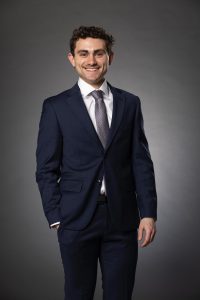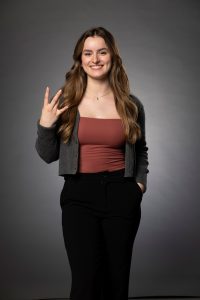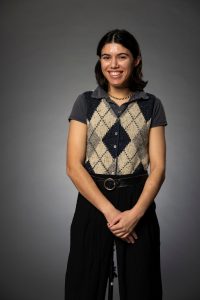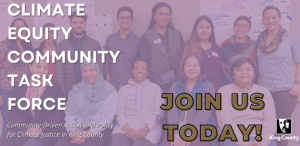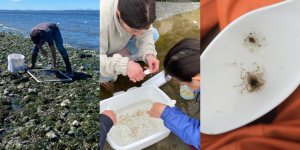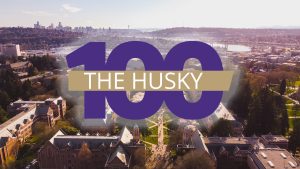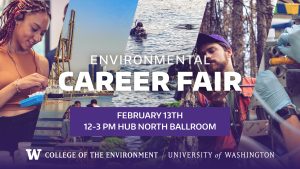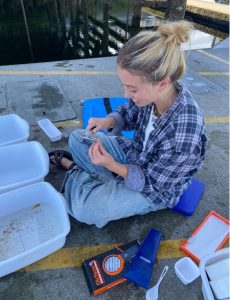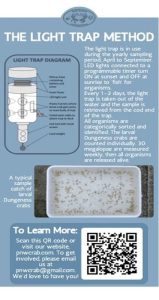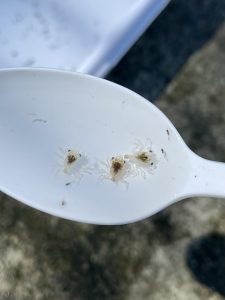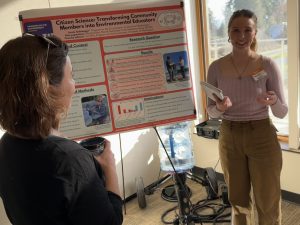The Program on the Environment will host the Spring 2025 Capstone Symposium on Wednesday, May 28th (online) AND on Wednesday, June 4th (in person) at the UW School of Aquatic Fisheries & Science. All are welcome to attend and support students as they present on the culmination of their hard work over three quarters.
The Capstone Course Series is a highlight for many students, and serves to catapult some into their first jobs or even their dream careers. Through internships, research, and social media training, students come out of the experience well equipped to communicate about the problem they sought to solve, and to tie their academic learning with specific research questions.
This event is open to the public, and we encourage students interested in learning about the Capstone, as well as members of the community, to join us.
The following link will provide the Day 2 Event Program.
Spring 2025 Symposium Schedule
Day 1: Online Poster Symposium (Wednesday May 28th)
4:30 PM – 4:40 PM Welcome & Session Overview
4:40 – 4:50 PM Session A Speaker Intros
4:50 – 5:50 PM Poster Session A — Natural Science, Restoration, & conservation, Education & outreach
| Alex Brunke (Room #1): Heat Islands and Ecological Restoration: Exploring Potential Linkages. Site Partner: City of Sammamish |
| Julia Bullock (Room #2): Building a Sustainable Future: Optimizing Digital Content for Environmental Education. Site Partner: Sustainability Ambassadors |
| Chelsea DeGrande (Room #3): Eco-Engagement: Discovering Effective Social Media Strategies for Environmental NGOs. Site Partner: Seattle Subway Foundation |
| Jordan Genuario (Room #5): Underwater Real Estate: Analyzing Policy Frameworks for Effective Eelgrass Restoration on the U.S. West Coast. Site Partner: NOAA Fisheries |
| Ruby Gumaelius (Room #6): Roots of Awareness, Branches of Action: Environmental Knowledge-Action Gaps In Preschool-Aged Students. Site Partner: Fiddleheads Forest School |
| Yifan Han (Room #7): Trash Talk: Zines, Waste Systems, and Environmental Justice in Seattle. Site Partner: Collaborative for Socio-Ecological Engagement |
| Deja Jackson (Room #8): Ship Happens: Research Vessel Exhaust Impact on Ocean Acidification Research. Site Partner: NOAA PMEL |
| Roy Jen (Room #9): Salmon, Forests, and Fire: Barriers to Collaboration, Integration of Holistic Practice. Site Partner: The Nature Conservancy |
| Sebastian Kuhn (Room #10): Communicating Science: Navigating Controversial Topics with Reason. Site Partner: NOAA Fisheries |
| Mayah Levy (Room #11): Green Minds: Environmental Education as a Catalyst for Eco-Conscious Values. Site Partner: Collaborative for Socio-Ecological Engagement |
| Ben Loke (Room #12): Science Communication in a New Information Age: Utilizing Social Media as an Environmental Education Tool. Site Partner: Collaborative for Socio-Ecological Engagement |
| Keagan McMurray (Room #13): An Environmental Communicators Guide to Combating Climate Misinformation. Site Partner: Puget Soundkeeper Alliance |
| Olivia Michaels (Room #14): Strategic Recovery: Incorporating Regional Dynamics Into Abalone Conservation. Site Partner: NOAA Fisheries |
| Bridget Murphy (Room #15): Conservation in Plain Sight: Using Educational Displays to Connect NOAA and Communities. Site Partner: NOAA Fisheries |
| Molly Rabus (Room #16): Reshaping Climate Change Education for Elementary Students. Site Partner: Sound Salmon Solutions |
| Hailey Roberson (Room #17): Transportation Education: Addressing High Schoolers concerns with Seattle Transit. Site Partner: Seattle Subway Foundation |
| Mateo Salgado (Room #18): Bridging the Gap: Improving Ecological Thinning Strategies in Western Washington for Climate Adaptation. Site Partner: Northwest Natural Resource Group |
| Olivia Young (Room #19): Bridging the Gap: Trust, Transparency, and Digital Tools in Environmental Communication. Site Partner: NOAA Fisheries |
5:50 – 6:00 PM Break
6:00 – 6:05 PM Session B OVerview
6:05 – 6:15 PM Session B Speaker Intros
6:15 – 7:15 PM Poster Session B — business & sustainability, justice & equity, Policy & regulation
| Layla Airola (Room #1): From Brain Drain to Brain Gain: Preserving Institutional Knowledge in Student-Run Environmental Research Organizations. Site Partner: UW School of Oceanography |
| Molly Barham (Room #2): Exploring How We Can Combine Online Communities and Information Resources To Tackle the Issue of Behavior Change Concerning Sustainability. Site Partner: rePurpose Whidbey |
| Kristina Gerard Canonizado (Room #3): Redlining Today: Greenspace Inequity, the Detrimental Effects of It and How the City of Seattle Confronts It. Site Partner: UW Center for Nature and Health |
| Aiden Cox (Room #4): Circularity Counts: Addressing the Waste Issue Through Community-Centered Institutions. Site Partner: Seattle REconomy |
| Anna Crow (Room #5): Local Nonprofits Have Our Backs– Who Has Theirs? Site Partner: The Nature Project |
| Sarah Doolittle (Room #6): The Hidden Health Risk Next Door: Tackling Urban Noise with Resonator-Enhanced Barriers. Site Partner: Illimited Lab |
| Sammy Harrison (Room #7): Behind the Seams: Understanding Youth Attitudes Toward Sustainable Clothing and Textile Waste. Site Partner: The Mendful Program at Ginger’s Closet |
| Quinn Johnson (Room #8): Continued Corporate Sustainability Growth Under Current Political Conditions. Site Partner: Nasdaq |
| Olivia Knutson (Room #9): Strengthening Material Reuse in King County: Barriers, Solutions, and Circular Potential. Site Partner: King County |
| Hope Kuchan (Room #10): Oral History, TEK, and Trust: Multiple Ways of Knowing in the Climate Crisis. Site Partner: NOAA Fisheries |
| Sadie McGee (Room #11): The Problem with Stuff: Barriers and Solutions to a Free Store. Site Partner: UW Recycling |
| Callum Mitchell (Room #12): Creating Sustainable Transit-Oriented Development: How Seattle Can Grow its Light Rail Network Sustainably. Site Partner: Seattle Subway Foundation |
| Sydney Morris (Room #13): From Plastic to Pixels: Empowering Circular Action Through Website Design. Site Partner: rePurpose Whidbey |
| Dylon Ongwiseth (Room #14): Protecting the Puget Sound: How Green Stormwater Infrastructure Can Save our Waters. Site Partner: Sustainable Ballard |
| Kina Painter (Room #15): 3 Barriers to Entering the Environmental Workforce and how to Remove them. Site Partner: NOAA Fisheries |
| Sarah Spector (Room #16): From Discard to Discovery: Establishing a Free Reuse Store at the University of Washington. Site Partner: UW Recycling |
| Hazel Stoyka (Room #17): Sustainable and Safe: Redefining Healthcare without Compromise. Site Partner: Harborview Medical Center |
7:15 – 7:30 PM Closing Remarks
Day 2: Oral Presentation Symposium & Celebration (In-person, Wednesday June 4th)
UW School of Aquatic & Fishery Sciences | 1122 NE Boat St, Seattle WA 98105
4:30 – 4:40 PM Welcome & Housekeeping
4:40 – 5:10 PM Poster Highlights** & Refreshments
5:10 – 5:20 PM Break
5:20 – 5:25 PM Session Introduction
| 5:25 – 5:35 | Kendra Pearson: Raising the Curtain to Husbandry in Aquariums. Site Partner: MaST Center Aquarium |
| 5:35 – 5:45 | Jacob Williams: Climate Solution or Ecological Gamble? Understanding The Tradeoffs of Ocean Alkalinity Enhancement. Site Partner: NOAA Fisheries |
| 5:45 – 5:55 | Chloe Jazvic: Before We Engineer The Ocean: Reimagining Community Engagement in Marine Carbon Dioxide Removal. Site Partner: NOAA Fisheries |
| 5:55 – 6:05 | Jacob Jones: Why Ecoforestry? Site Partner: Northwest Natural Resource Group |
| 6:05 – 6:15 | CJ Applegate: Fueling Future Farmers: The Future is Regenerative. Site Partner: The Organic Farm School |
| 6:15 – 6:25 | Eliza Weyman: Mother Earth: Feminizing The Environment And Its Implications On Natural Resource Management. Site Partner: Braided River |
| 6:25 – 6:35 | Emma Freeman: Art as a Bridge: Connecting Relationship to Nature through Environmental Restoration & Immigration Stories. Site Partner: Partner in Employment |
6:35 – 6:45 pm Intermission
| 6:45 – 6:55 | Alex Johnson: Lengthening Linen Longevity: How the Barriers to Hotel Textile Recycling can be Overcome. Site Partner: Washington State University Textile Team |
| 6:55 – 7:05 | Jenna Williamson: Funding a Sustainable Future: Tool Libraries and Circular Economy Nonprofits. Site Partner: Seattle REconomy |
| 7:05 – 7:15 | Chancellor Hoppenrath: Tools for Curiosity: Hands on Sustainability and the Fight Against Perceived Obsolescence. Site Partner: Transition Fidalgo |
| 7:15 – 7:25 | Sean Carey: LEED-ing Green Futures: Understanding the Challenges of Widespread LEED Certification. Site Partner: King County Executive Climate Office |
| 7:25 – 7:35 | Shannon Cosgrove: The Language of Justice: Participation, Knowledge, and Power in Environmental Policy. Site Partner: Agency for Toxic Substances and Disease Registry, Region 10 |
| 7:35 – 7:45 | Megan Hassi: Clean Air Action: How Community-Driven Solutions Can Tackle Environmental Injustice in Policy Implementation. Site Partner: US Environmental Protection Agency, Region 10 |
| 7:45 – 7:55 | Benjamin Blatt: Blue State, Purple Policy: Lessons for Bipartisan Environmental Policy in the Puget Sound. Site Partner: Puget Sound Partnership |
7:55 – 8:00 Closing Remarks
8:00 – 8:30 PM Symposium ends & celebration continues in lobby
**Note: the judges will choose 10 posters from Day 1, which will be printed out and displayed during day 2. Those poster authors will be invited to present their posters during the reception.
